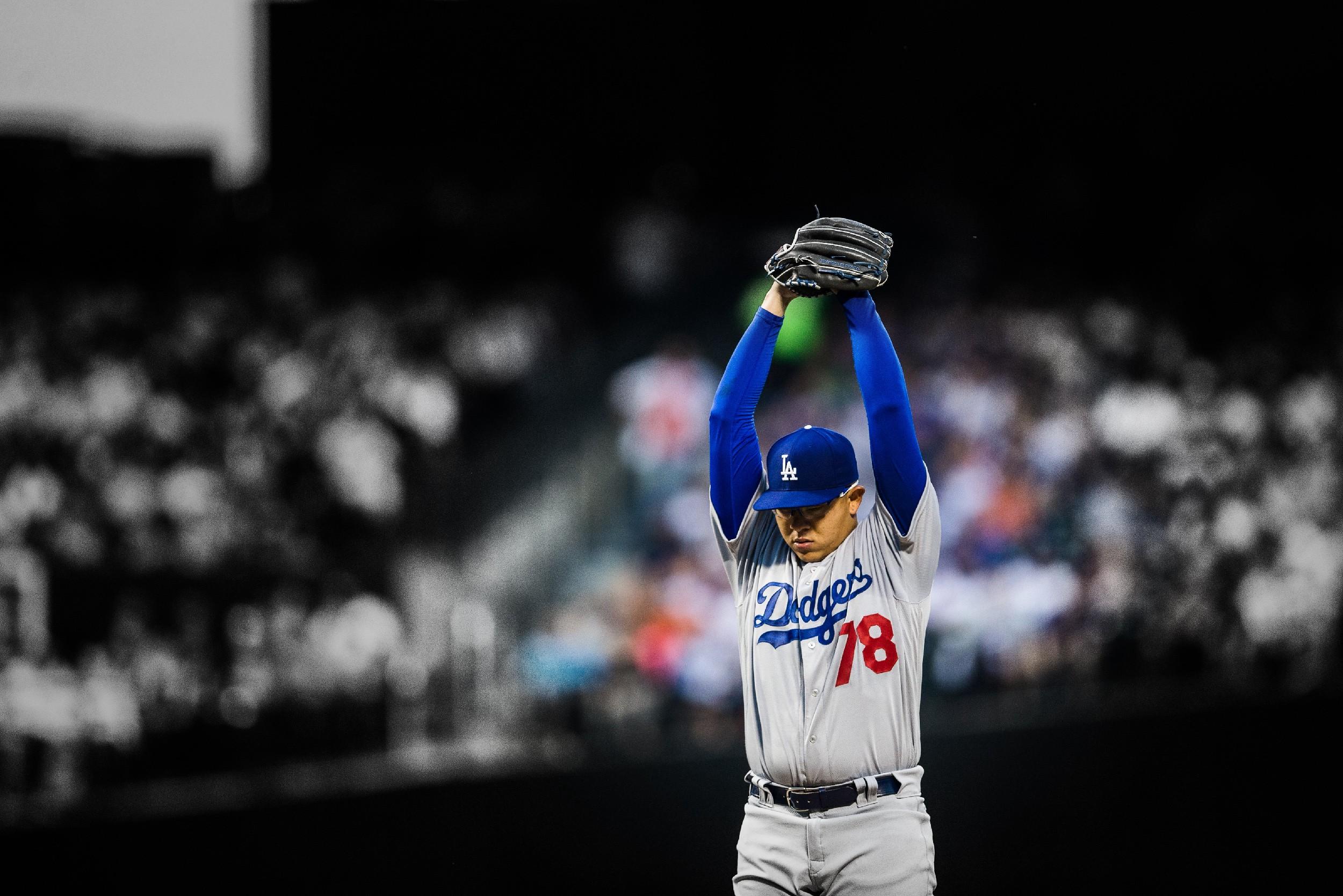
By MLB standards, Julio Urias is just a baby. And through two starts, like a newborn in a cradle, the 19-year-old has gotten rocked.
In his debut last week against the Mets, Urias allowed three earned runs and walked four in 2 2/3 innings. Yesterday, the Cubs touched him for six runs (five earned) in five innings of work. Far from showing up in the big leagues and dominating like he had at every other level, baseball’s top pitching prospect has an ERA north of 9 and a FIP well above 8.
Then again, you’re not supposed to be pitching in the big leagues at age 19. Urias is the first teenager to pitch in the majors since Dylan Bundy in 2012 and the first to debut as a starting pitcher since Félix Hernández in 2005. If Urias were American, he’d have been draft eligible out of high school in 2014, and his American contemporaries — Kodi Medeiros, Justus Sheffield, and Touki Toussaint, to name a few first-rounders from that year — are mostly in A-ball right now.
So, this isn’t an issue of “what is wrong with Urias?” He’ll probably be fine. Rather, his struggles offer a look into what’s troubling the Dodgers under Andrew Friedman.

In the minor leagues, the Dodgers went to great lengths to prevent Urias from overuse, often pulling him from outings prematurely. Since he was so advanced at such a young age, there was really no precedent for developing him. So, instead of putting Urias on a conventional path, Los Angeles promoted him quickly while using him conservatively. Yesterday, he faced 23 batters, tied for the second most he’s faced since he made his professional debut in 2013.
While Urias arrives in the big leagues as a healthy teenager with No. 1 starter potential, Dodgers manager Dave Roberts doesn’t need a kid with potential; he needs a starter he can lean on now. Even among the lighter workloads top pitching prospects tend to have upon entering the majors, Urias had almost no track record. As far as Baseball Reference has data, he’s never thrown 90 pitches in a start, much less 110. He’s never thrown 90 innings in a season, much less the 162 necessary to qualify for an ERA title or the 200-plus a No. 1 starter is expected to throw. Hell, he’s never even turned over a lineup three times as a pro.
That would be fine if he was going to pitch for two or three innings at a time out of the bullpen like many expected him to as a rookie. But instead, he’s going to have to figure out how to pitch deep into games and handle a starter’s workload for a team in a pennant race, against the toughest competition in the world.
Coddling Urias was unconventional, but so was calling him up and starting him with so few innings under his belt. It might not have been wrong, but it was a risk. And the Dodgers, now a disappointing 28–27, are looking down the barrel of what happens when a risky, high-variance approach to building a pitching staff backfires.

The Dodgers need Urias right now because instead of re-signing Zack Greinke, they surrounded Clayton Kershaw with starting pitchers — Hyun-jin Ryu, Brett Anderson, Alex Wood, Brandon McCarthy, and Scott Kazmir — who have durability issues. (Anderson, McCarthy, and Ryu have yet to pitch this year.) Plus, none of them are as good as Greinke. Replacing one of the best pitchers in baseball with a slew of high-variance starters was unconventional, and it’s gone about as badly as anyone could have expected.
Of course, you don’t hire Andrew Friedman and general manager Farhan Zaidi to run your team if you want to play it safe. In Tampa Bay and Oakland, respectively, Friedman and Zaidi cut their teeth in front offices that needed to get creative to overcome structural disadvantages.
The Rays (and to a lesser extent, the A’s) needed to chase every edge because they needed to take risks in order to compete with teams that could outspend them three-to-one. If everything went right, the Rays would win. If everything went wrong, well, they were expected to lose anyway, right?
The Dodgers don’t need to do take huge risks or grasp for every advantage: They play in Los Angeles, they’ve got the league’s largest payroll, and they’ve got Kershaw, Yasiel Puig, Corey Seager, and, yes, Urias. The deck is stacked in their favor.
How much better off would the Dodgers be if they’d just re-signed Greinke? Or if they turned Urias loose in the high minors a year or two ago? Maybe he’d have gotten hurt, but maybe he’d be ready to face big-league hitters as a starter.
If you’re looking for a metaphor, consider the fiasco from last week where Los Angeles nearly got in trouble for using a rangefinder and painted on-field markers to position their outfielders. How big an advantage could have been gained compared to, say, using hand signals from the dugout or distributing pregame scouting reports? There’s looking for competitive edges, and then there’s going down the rabbit hole and screwing around.
Friedman’s sin, then, is forgetting one of the cardinal laws of American society: If you’re rich, you’re probably going to win, even if you’re not all that smart. He doesn’t need to come up with creative ways to beat the house anymore. He is the house.